When I checked in to my holiday rental apartment in Bordeaux, France, one of the things I was looking forward to was being able to make my own meals. I didn’t require much: some fresh vegetables and pasta would suffice for dinner, while a hunk of fresh baked bread topped with cheese and drizzled in rich green olive oil was my idea of a perfect breakfast. The property manager, Charlotte, met me upon arrival and circled a couple of local grocers and a good bakery on a map for me.
“Will I be able to buy good quality cheese at any of these places? I asked.
“Yes, but if you really want to sample French cheeses you must visit Fromagerie Deruelle, a gourmet cheese shop just a few blocks from here.” Charlotte said.
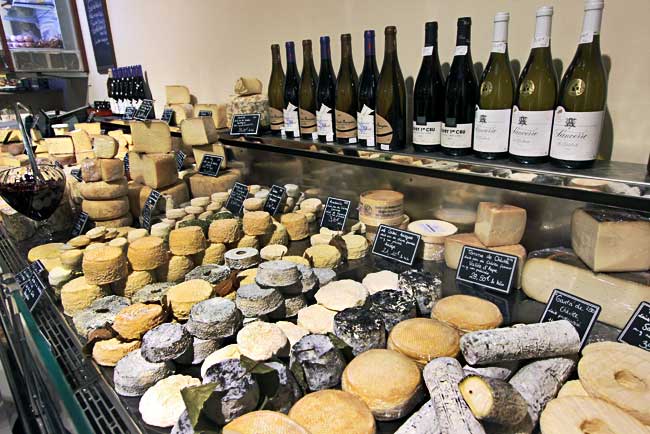
I’d been introduced to French cheeses some weeks earlier by my friends, Jean-Luc and Sabine Perrotin. We were enjoying dinner at their home near Paris one evening when Jean-Luc told me about a friend who had been visiting the department of Haute-Savoie in the Rhône-Alpes region of eastern France, where an especially stinky variety of cheese known as Reblochon is produced. Upon returning from his travels, the friend stopped by Jean-Luc’s office with a gift of Reblochon. Not thinking, he dropped the package into his desk drawer. As the day progressed, the smell of the cheese penetrated it’s wrapping and began to seep into the room; by the end of the day his co-workers were wrinkling up their noses and commenting on the strange smell. Guesses as to its source ranged from clogged sewers to a dead rat in the vents.
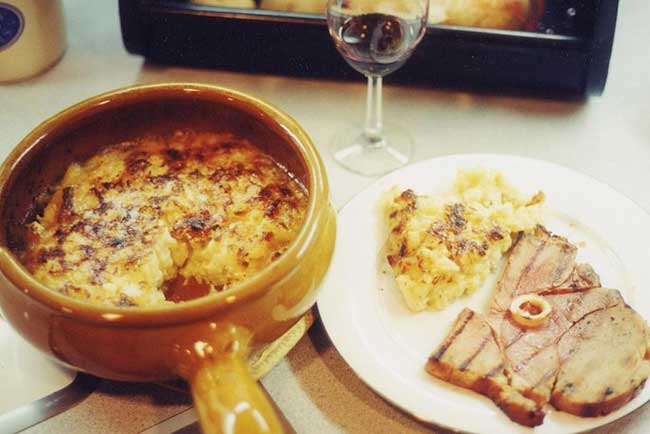
“I never told anyone about the cheese in my desk drawer – I figured it was better that way,” he laughed. “It smells terrible but it tastes wonderful once it’s cooked. Tomorrow night, Sabine will make a casserole for us called ‘Tartiflett,’ a famous dish using potatoes, onions and Reblochon cheese.”
The following evening I sat down to dinner with a modicum of skepticism. Despite Jean-Luc’s assurance that the cheese lost its strong odor when cooked, a pungent odor suffused the house. Cautiously, I tasted a spoonful of the creamy white casserole. It was delicious! And not the least stinky tasting.
Sabine was clearly pleased that I approved of her recipe. “You could eat a different type of cheese every day for a year and still not sample all the varieties produced in France,” she said. Maybe so, but I had six weeks in France and I was going to do my level best to taste as many as possible.
By the time I arrived in Bordeaux I’d tried Brie, Comté, Emmental, Munster and several cheeses made from goat and sheep milk but I had a long way to go if I was to make a dent in the list of 365 varieties. So, first thing the next morning I hunted down Fromagerie Deruelle. More than a hundred cheeses in wheels, slabs, and wedges were displayed on tables, in coolers, and in refrigerated cases. Some were white and creamy, others were hard and bright orange; one entire shelf was devoted to different varieties of Bleu cheese. In addition to popular varieties like Comté, which are produced in large quantities, Fromagerie Deruelle also offered scores of fermier cheeses, which are produced in relatively small quantities by farmers using milk from their own farm, and artisanal cheeses, which are also produced by farmers who may supplement their own milk with milk from local farms. I perused the mind-boggling options without a clue where to start.
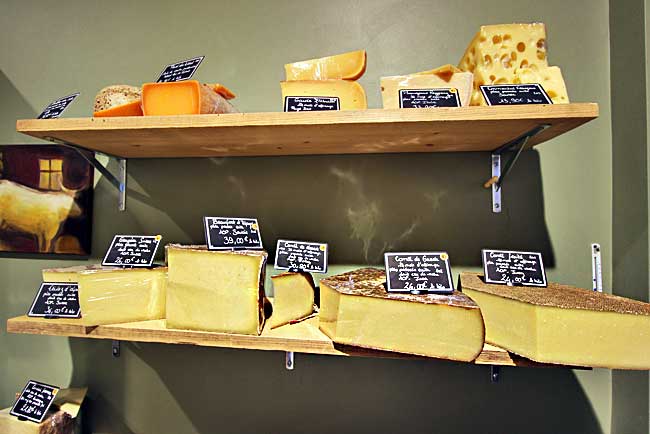
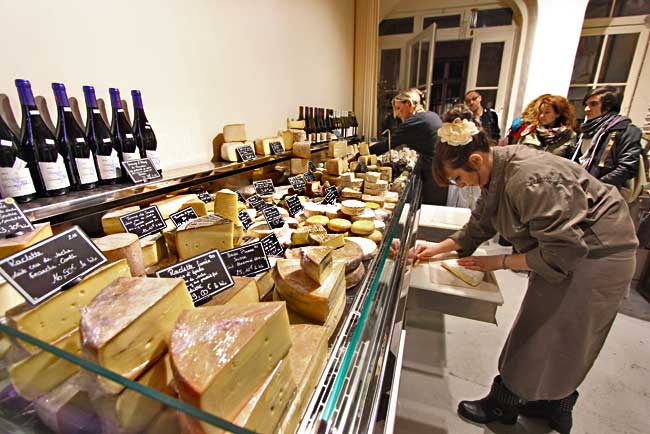
Fortunately, the young saleswoman, Paulina Traellard, spoke some English and was happy to make suggestions. I left with a soft, rustic Brie de Meaux; a Chevrotin made from goat’s milk; and a robust Camembert. A quick stop at the bakery across the street to pick up a traditional French baguette, still warm from the oven, and I was all set. And so my days went. For the next week I virtually lived on cheese. I topped salads with it, made grilled cheese sandwiches, and ate it unadorned.
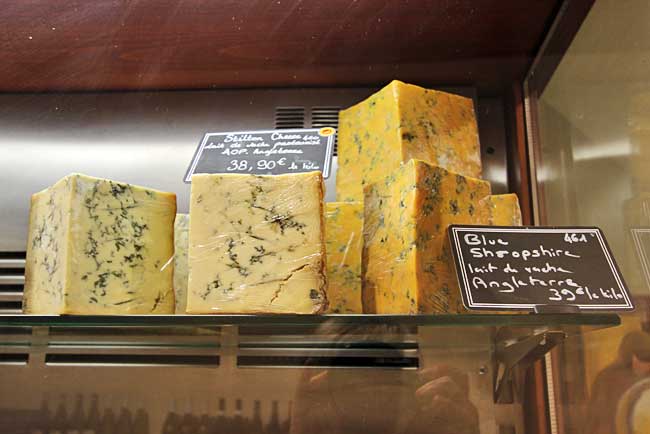
By my third visit the owner, Alodie Deruelle, was greeting me personally and I couldn’t resist asking how she had come to open a gourmet cheese shop. She grew up on farms, learning the art of cheese making first hand and eventually attended university, where she studied agriculture. After graduation she worked in a big cheese shop in Lyon for a number of years. Finally, in 2011 she opened Fromagerie Deruelle, realizing her lifelong dream.
Deruelle is extremely picky about the products she chooses for the shop. She and Paulina personally visit the farms and sample each variety before agreeing to add it to the inventory, which includes a full range of cheeses produced from cow, sheep, and goat milk. Though they sell cheeses that hail from all parts of France, there is heavy emphasis on the two regions that Deruelle knows best, Bourgogne and Lyon.
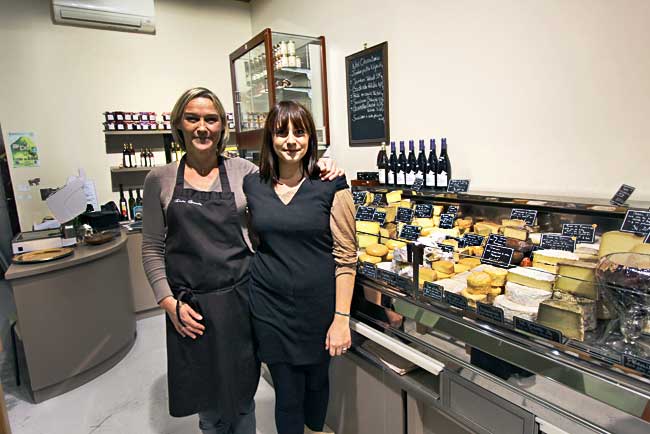
I continued to sample different varieties but it wasn’t long before I had favorites. My craving for Comté and Brie grew to the point of addiction. Knowing I would be returning home for Christmas, I researched the possibility of sending some of my favorites home in bulk, but the importation of French cheeses into the U.S. is a complicated issue. Customs will seize any soft French cheeses, as many are not pasteurized and the process of winning approval to export food products to the U.S. is so expensive and complex that few independent French farmers can afford to try. Unfortunately, the only way to taste real French cheeses is to go to France. And that’s definitely not a bad thing, as it gives me good reason to return.
Fromagerie Deruelle is located at 66 Rue du Pas Saint Georges in Bordeaux. Their telephone is 05-57-83-04-15 (country code +33). Email them at [email protected]. In addition to cheese, the shop sells honey, butter, cream, wines, and frommage blanc.

try the Munster from Alsace with cumin seeds and a glass of alsatian riesling ! superbe !
Ooh! That’s making my mouth water, Gerard. I’ll be in France in a couple of days so I’ll try it for sure.
365 variety of cheese?! One for each day – sounds good to me! I am so much of a cheese lover that when my boyfriend and I were snowboarding in Chamonix and traveled to Paris, I think we might have lived on cheese and fresh baguette, and their chocolate croissants almost daily! We ended up loving the raclette (fondue) with meats and potatoes. French cheese IN France is definitely the best place to have them. Nothing else seems to compare!
Hi Antoinette: Good to know there are other [people in the world who are as addicted to cheese as I am. I’ve been gone from France a while now and I’m still in withdrawal.
the French are insane with their cuisine …
What an utterly ridiculous comment.
I am your new loyal reader, Barbara. Came across one of your photos on Facebook, came here to read a sampling of your blogs and ended up “sampling” wonderful cheeses. I’m here to stay.
Hi Kathleen: Sorry it took me so long to reply, but I’ve been on a press trip and my time was not my own. So gad you like my blog and thanks for taking the time to leave a comment explaining how you found me. Sounds you we are cheese loving soul sisters 🙂
I am also a cheese adict but I have to make sure I moderate my passion for fear of piling on the pounds. Better to have a small slice of something really delicious, but if only one could stop there!
I hear you Heather! I’m trying to lose the weight I put on in France and Spain and I’m quite sure cheese was the biggest culprit.
This would be a VERY dangerous shop for me, my waistline, and my bank account.
LOL Talon: It WAS a very dangerous shop for my waistline. I’m still trying to shed the pounds I gained from my travels through France and Spain (but it was worth it!)
“You could eat a different type of cheese every day for a year and still not sample all the varieties produced in France,” she said – Sounds like heaven!
Certainly my idea of heaven, Boyde! 🙂
I love stinky cheese too!
Hi Cristina: I never new so many people love stinky cheese! Just had a message from my friends in Paris who so graciously let me stay with them;they’ve offered to make anther Tartiflette when I return. How can I resist?
Love stinky cheese! I must have passed this Formaggerie but I regret not going in. We passed by the shop and it definitely caught our attention. We kept looking around to see what was emitting that aroma. The only answer was the shop. Later on we ran into some incredible cheeses at the Sunday market in the Quai des Chartrons.
So sorry you didn’t go in, Eduardo. Between Fromaggerie Deruelle and the bakery across the street, which people told me was the best one around, that particular street always smells delicious.
Great article! If I’m ever in Bordeaux I’ll be visiting this place. I’m also a huge fan of cheese. If you ever find “Beaufort” cheese, I highly recommend it. It’s from the Savoie region, just like Abondance, and is made from raw cow’s milk, giving it amazing intense flavor! I like munching on it as a snack, but it can also be used in a fondue.
Hi Thomas: Beaufort just got added to my “must taste” list, along with Abondance and Shropshire. Love all these recommendations, because I just stand in front of the display, mystified by the variety, and end up choosing the ones I already know are wonderful.
If I had to choose (and I sinercely hope I NEVER do!) between chocolate, gelato and cheese, cheese would win! I try to restrict myself to goat’s cheese these days because of the lower cholesterol. Fortunately, they are the norm here, daily farming never having existed. I was surprised and ‘chuffed’ to see English cheeses there! What a compliment to find English cheese in a French speciality shop. I’ve never even heard of Shropshire cheese, though almost every county in England has its own speciality. Sadly most on the supermarket shelves and exported are awful but if you buy in local markets they are delicious!
Hi Linda: I am SO with you. I can do without chocolate (barely) and I’m not much of an ice cream or gelato fan. But I simply cannot live without cheese. And boy, are you right about the imported cheeses we have in the U.S. They are truly terrible – even the U.S. version of the same brand that I bought in France is horrible. I finally gave up trying, knowing I’m going back next month!
Did you get to try Abondance? Its my new fave, truly delicious.
But did you know that the UK produces a broader variety of cheeses than France does, come and check them out!
Hi Helen: Nope – never tried or even saw Abondance. I’m headed to the UK next month, so good to know about their cheeses. It woill make me a very happy camper if the cheeses are as good as those in France.
Wonderful details! Pictures were great. Made me so hungry! How do cheeses from other countries compare?
Hi Lynn: French cheeses are far superior to any I’ve tasted from any other country…so far 🙂
I LOVE cheese. This is the easiest blog post ever for me to get hungry by reading!! Would love to go there and sample them all. Is this a well known place or a bit of a hidden secret? Jonny
Hi Jonny: I don’t think it’s a secret, but the shop is fairly small and located in a residential neighborhood, so most tourists wouldn’t even notice it. But every time I was there, it was filled with customers. Not hard to understand why, the owner and her assistant are so passionate about cheese!
The Comte looks gorgeous! I love the story about the stinky cheese in the desk – I think I’d also be too embarrassed to say anything. I can never remember which cheeses are supposed to be kept in the fridge and which should be at room temperature…
Kerry, the Comte is so delicious! The owner of the shop told me that Comte is not only the most famous, but also the most popular cheese in France.
That would be a great project–to try all 365 cheeses! I love cheese, and I love shops like this, where the owners are so knowledgeable about their products.
Hi Margaret: Though I initially set out to try as many varieties as possible, my problem was that I found two that I liked so much that I kept coming back to them. I probably tried 20-25 varieties – just a drop in the bucket. But I had lots of fun doing it.